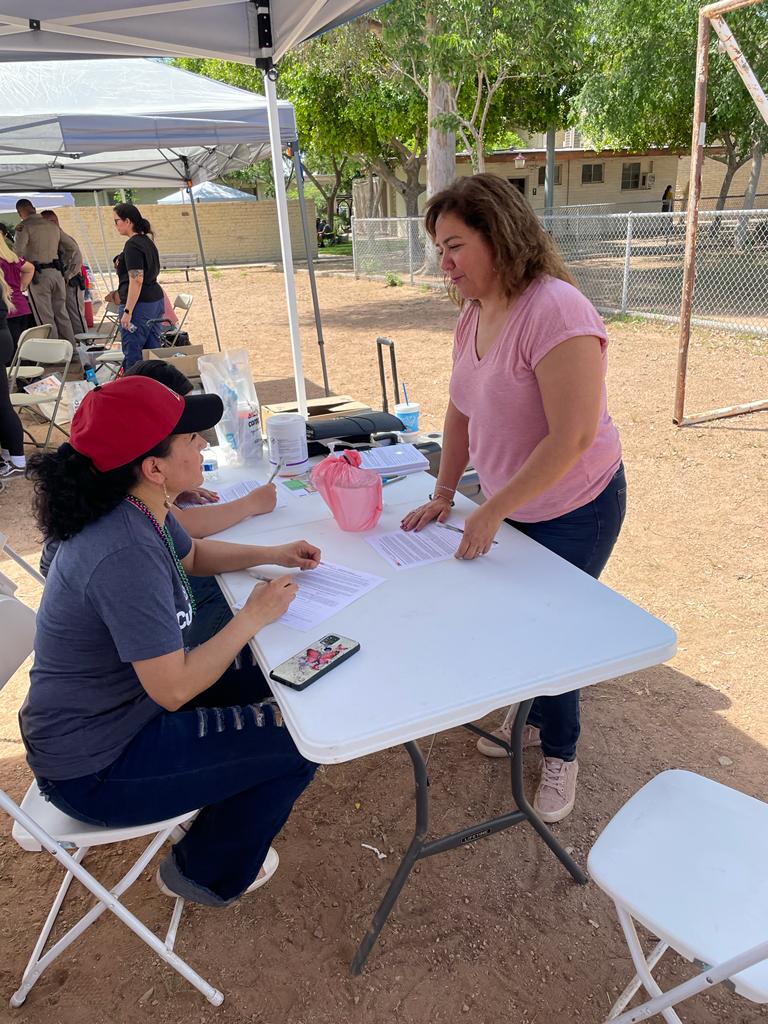Apoyo (support) for Latin American Asylum Seekers: Feasibility and pilot test of a promotora-led COVID-19 testing intervention

Latin American Asylum-Seekers
Susan Pepin, PhD
Hyunsung Oh, PhD
Flavio F. Marsiglia, PhD
Crista Johnson-Agbakwu, PhD
Vel Murugan, PhD
Tomas Leon
Edny Gonzalez
Ruth Escobar
This project aimed to adapt and deliver an existing promotora-led COVID-19 testing intervention for asylum-seekers in Maricopa County by addressing their unique barriers to testing and follow-up care. In coordination with community partners, promotoras offered saliva-based PCR testing to the target population. The project sought to understand the feasibility and acceptability of the intervention through qualitative assessments, exploring challenges and facilitators among promotoras, case managers, and asylum-seekers. Additionally, the project endeavored to identify Social Determinants of Health influencing knowledge, attitudes, and behaviors related to COVID-19 mitigation and vaccine hesitancy within this population.
To mitigate the increased risk of exposure to SARS-CoV-2 among Latin American asylum-seekers in Arizona. By providing targeted testing, follow-up care, and understanding the specific challenges faced by asylum-seekers, the project sought to minimize the health disparities exacerbated by crowded living conditions, employment in essential service industries, language barriers, and limited access to healthcare.
Community-driven and culturally congruent intervention, utilizing a Community Based Participatory Research (CBPR) orientation. This approach includes adapting and delivering a promotora-led COVID-19 testing intervention, coordinating testing at different levels of the social ecosystem, engaging and training local Community Health Workers (CHWs) for saliva-based COVID-19 testing, delivering test results, providing wrap-around services and provider referrals for positive cases, and sustaining the intervention during a follow-up period.
- The study found that a fourth of respondents reported any symptoms of COVID-19 among non-citizens predominately seeking asylum who were released by federal immigration authority passing security vetting. Our findings suggest that Latinx and female asylum seekers are more likely to be family-unit migrants, which increases the epidemiological risks that this vulnerable group endures through migration during the COVID-19 pandemic. Social workers should advocate for policies and programs that address structural barriers contributing to their limited access to resources mitigating the risk of COVID-19 infection.
- In the study survey, most people (87.9%) answered in Spanish, and over half of them (55.6%) were Latinx. The average age was 33.4, and many identified as asylum seekers. Comparing those who answered in Spanish to those in English, the Spanish group had more females, more Latinx individuals, and more people seeking asylum. The Spanish group also knew more about COVID-19 risks, liked wearing masks more, and faced more economic challenges during the pandemic compared to the English group. However, there were no significant differences between Latinx and non-Latinx respondents.
Presentations:
May 30-June 2, 2023
Society of Prevention Research 31st Annual Meeting
Session name: Exploring the Experiences of Latin American Asylum Seekers Who Participated in a Culturally Grounded Promotoras-Led COVID-19 Testing Intervention
Presenter: Marsiglia F.
October 5-7 2023
Conference: Congreso Mundial de Trabajo Social 2023
Title of Presentation: Experiencias y Desafíos de Solicitantes de Asilo en la Frontera Sonora-Arizona en Tiempos de Pandemia
Presenters: Beatriz Vega-Luna
January 10-14, 2024
SSWR 28th Annual Conference. Oral poster
Economic Challenges and Resilience Among Asylum Seekers from Central and South America during COVID-19 Pandemic
Presenter: Oh H.
January 10-14, 2024
SSWR 28th Annual Conference. Oral poster
Profile of COVID-19 Symptomatology and Its Correlates Among Non-Citizens, Predominately Seeking Asylum, Released By Federal Immigration Authorities
Presenter: Oh H.
Keywords: COVID-19, Health disparity, Asylum-Seekers, Community Health Workers